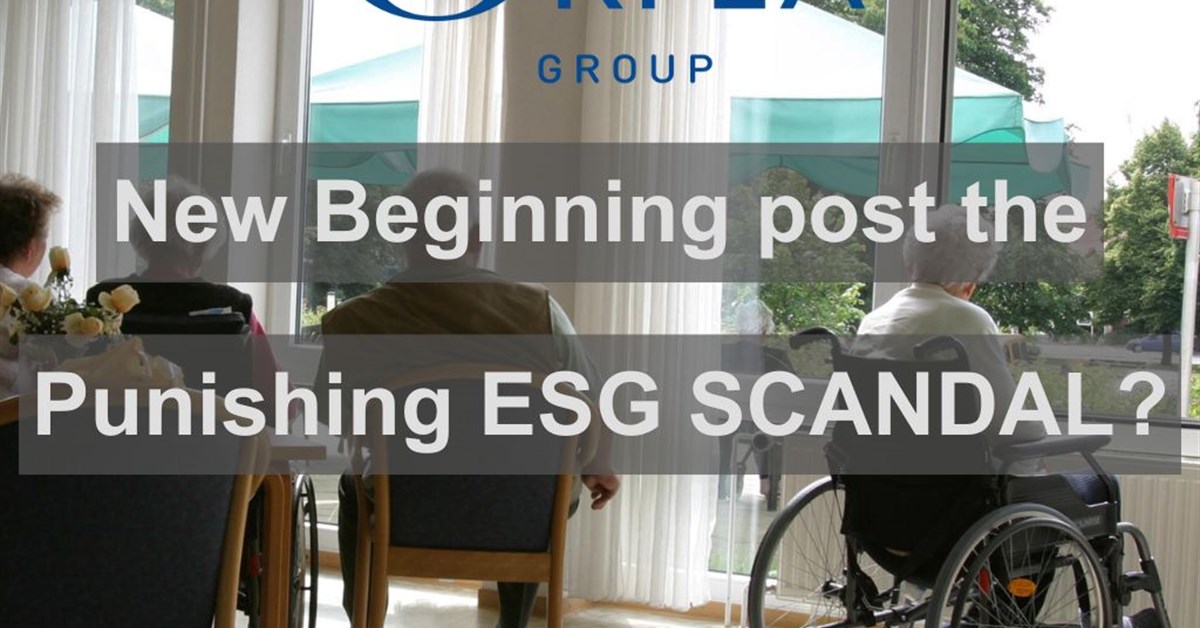
ORPEA: Painful Lesson from ESG Scandal
Orpea has reached an agreement for its financial restructuring plan, announced in November 2022, with a group of equity investors led by the French public establishment Caisse des Dépôts et Consignations (CDC), and a group of financial creditors holding half of the company’s unsecured debt, i.e. with a total face value of €3.8bn, led by five principle institutions (the “SteerCo”).
Three rounds of capital increases have been projected:
- the €3.8bn unsecured debt to be converted into equity at a conversion rate of 30%
- a recap without preferential rights of €1.15bn new money to be fully subscribed by CDC alongside CNP Assurances, MAIF and MACSF, etc.
- another recap with preferential rights of €0.4bn new money to be subscribed by CDC and its partners on a pro-rata basis (for €0.2bn) and other existing shareholders, with a SteerCo’s take-up (guarantee) of what is not subscribed by minorities (for up to €195m)
Existing shareholders staying on the sideline will see their ownership reduced to 0.4% of their original value; CDC and its partners will hold a 50.2% stake and unsecured financial creditors will own 49.4%.
Other agreements comprise an overhaul of the board including seven seats (out of 13) appointed by the CDC-led alliance, the separation of the Chair/CEO positions and no public offer over five years, etc.
Analysis
Orpea’s long-lasting debt restructuring discussions have finally been concluded before it went to the wall. Both the unprecedented equity dilution (250x), down to 0.4%, and the 70% value loss on unsecured debts is an industry-wide lesson about making ESG claims while pursuing only financial objectives and weak self-interested governance. ESG risks can become extremely costly. Orpea’s unethical chase for excess profits and the resulting reset of industry standards is also a reset for the whole of the nursing homes industry, listed or not. It is a big ESG lesson for all.
The rescue injection and takeover by the French state-owned CDC provides fresh cash (€1.35bn in total) but, above all, leaves no hope for a return to pre-scandal high profitability and the resumption of any shareholder payout for at least the mid-term. With a clear priority for public interest, the new Orpea will be the new benchmark for the reasonable use of public resources (most of the costs are actually borne by Social Security) and for treating those fragile elderly residents/patients decently. A much higher ratio of staff to dependent seniors is required to ensure the quality of services, thereby completely changing the industry’s economics and the balance of competition.
Separately, converted debt holders are expected to dispose of their shares rapidly, as they were mostly taking a bet not on Orpea but on where the knife would fall. This should recreate a wide float eventually, with equity investors having an ESG mandate buying into a no-growth story.
Back-of-the-envelope calculations leave a spectacular upside potential (3x or more). This is paradoxical but stems from the fact that it assumes that debt is repaid through cash flows, so that value accrues to shareholders and that value is on multiples which are not too distant from history. Where the new multiple will land is bound to be a painful learning curve that only investors with impact-type mandates will consider.
Impact
We have integrated the terms of the related agreement following the debt holders’ discussions and recap plans and we have broadly maintained our estimates regarding Orpea’s EBIT outlook. This is very likely to be trimmed as the new governance sets a new course. Our target price drops 9%.
For valuations, contact - press@alphavalue.eu
Analyst - Yi ZHONG


